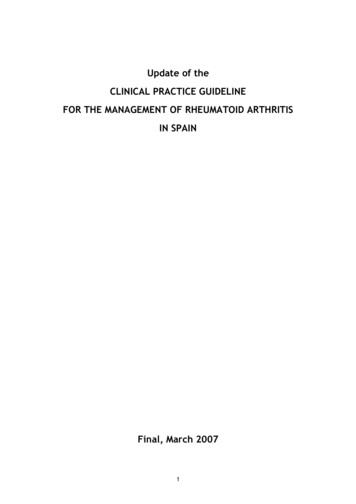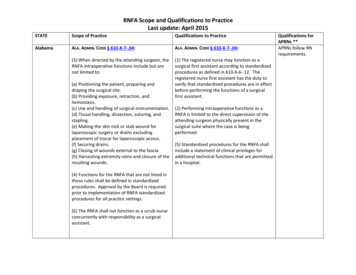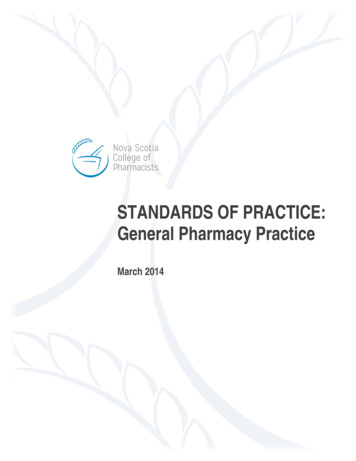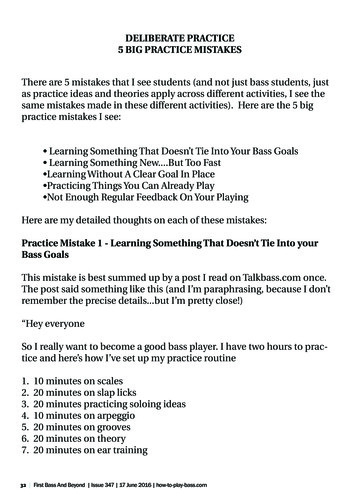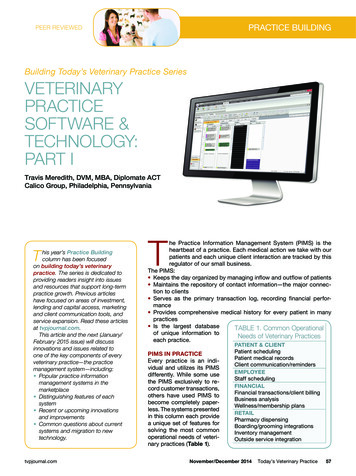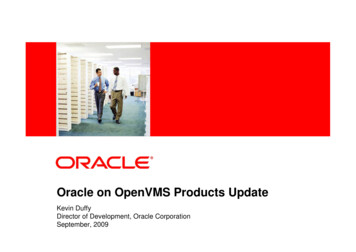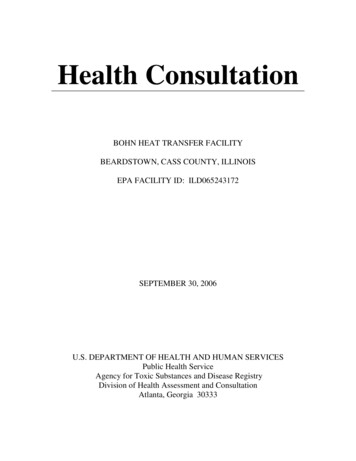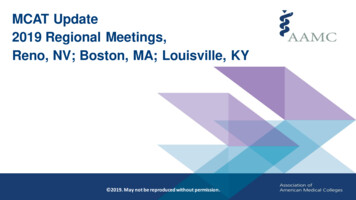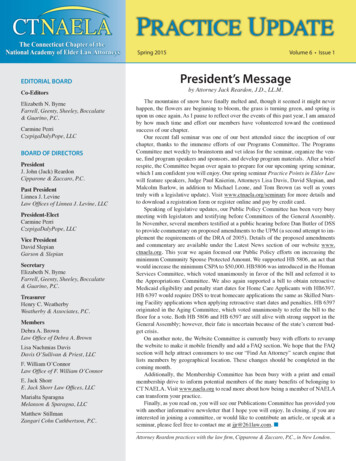
Transcription
Practice UpdateSpring 2015EDITORIAL BOARDCo-EditorsElizabeth N. ByrneFarrell, Geenty, Sheeley, Boccalatte& Guarino, P.C.Carmine PerriCzepigaDalyPope, LLCBOARD OF DIRECTORSPresidentJ. John (Jack) ReardonCipparone & Zaccaro, P.C.Past PresidentLinnea J. LevineLaw Offices of Linnea J. Levine, LLCPresident-ElectCarmine PerriCzepigaDalyPope, LLCVice PresidentDavid SlepianGarson & SlepianSecretaryElizabeth N. ByrneFarrell, Geenty, Sheeley, Boccalatte& Guarino, P.C.TreasurerHenry C. WeatherbyWeatherby & Associates, P.C.MembersDebra A. BrownLaw Office of Debra A. BrownLisa Nachmias DavisDavis O’Sullivan & Priest, LLCF. William O’ConnorLaw Office of F. William O’ConnorE. Jack ShorrE. Jack Shorr Law Offices, LLCMarialta SparagnaMelanson & Sparagna, LLCMatthew StillmanZangari Cohn Cuthbertson, P.C.Volume 6 Issue 1President’s Messageby Attorney Jack Reardon, J.D., LL.M.The mountains of snow have finally melted and, though it seemed it might neverhappen, the flowers are beginning to bloom, the grass is turning green, and spring isupon us once again. As I pause to reflect over the events of this past year, I am amazedby how much time and effort our members have volunteered toward the continuedsuccess of our chapter.Our recent fall seminar was one of our best attended since the inception of ourchapter, thanks to the immense efforts of our Programs Committee. The ProgramsCommittee met weekly to brainstorm and vet ideas for the seminar, organize the venue, find program speakers and sponsors, and develop program materials. After a briefrespite, the Committee began over again to prepare for our upcoming spring seminar,which I am confident you will enjoy. Our spring seminar Practice Points in Elder Lawwill feature speakers, Judge Paul Knierim, Attorneys Lisa Davis, David Slepian, andMalcolm Barlow, in addition to Michael Leone, and Tom Brown (as well as yourstruly with a legislative update). Visit www.ctnaela.org/seminars for more details andto download a registration form or register online and pay by credit card.Speaking of legislative updates, our Public Policy Committee has been very busymeeting with legislators and testifying before Committees of the General Assembly.In November, several members testified at a public hearing before Dan Butler of DSSto provide commentary on proposed amendments to the UPM (a second attempt to implement the requirements of the DRA of 2005). Details of the proposed amendmentsand commentary are available under the Latest News section of our website www.ctnaela.org. This year we again focused our Public Policy efforts on increasing theminimum Community Spouse Protected Amount. We supported HB 5806, an act thatwould increase the minimum CSPA to 50,000. HB5806 was introduced in the HumanServices Committee, which voted unanimously in favor of the bill and referred it tothe Appropriations Committee. We also again supported a bill to obtain retroactiveMedicaid eligibility and penalty start dates for Home Care Applicants with HB6397.HB 6397 would require DSS to treat homecare applications the same as Skilled Nursing Facility applications when applying retroactive start dates and penalties. HB 6397originated in the Aging Committee, which voted unanimously to refer the bill to thefloor for a vote. Both HB 5806 and HB 6397 are still alive with strong support in theGeneral Assembly; however, their fate is uncertain because of the state’s current budget crisis.On another note, the Website Committee is currently busy with efforts to revampthe website to make it mobile friendly and add a FAQ section. We hope that the FAQsection will help attract consumers to use our “Find An Attorney” search engine thatlists members by geographical location. These changes should be completed in thecoming month.Additionally, the Membership Committee has been busy with a print and emailmembership drive to inform potential members of the many benefits of belonging toCT NAELA. Visit www.naela.org to read more about how being a member of NAELAcan transform your practice.Finally, as you read on, you will see our Publications Committee has provided youwith another informative newsletter that I hope you will enjoy. In closing, if you areinterested in joining a committee, or would like to contribute an article, or speak at aseminar, please feel free to contact me at jjr@261law.com. Attorney Reardon practices with the law firm, Cipparone & Zaccaro, P.C., in New London.1
CT NA E L A P r a c t i c e U p d at eWhen NonLawyers Participate in MedicaidPlanning Activitiesby Attorney Carmine PerriThe purpose of this article is to heighten awareness regarding theissue of whether nonlawyers who participate in Med icaid planning activities are engaging in the unauthorized practice of law.I. The Unauthorized Practice of Law RegardingNonLawyer Medicaid Planning in Florida.Before discussing the merits of the Florida Supreme Court’sJanuary 15, 2015 Order, a preliminary review of the proceduralhistory will prove helpful.“The Florida Elder Bar Section’s Unlicensed Practice of LawSubcommittee petitioned the Florida Bar’s Standing Committeeon the Unlicensed Practice of Law (herein “Standing Committee”) for an advisory opinion on whether it constitutes the unlicensed practice of law for a nonlawyer to engage in the followingMedicaid planning activities leading up to the Medicaid application: (1) drafting of personal service contracts; (2) preparationand execution of qualified income trusts; or (3) rendering legaladvice regarding the implementation of Florida law to obtainMedicaid benefits.” The Florida Bar Re: Advisory Opinion- Medicaid Planning Activities by NonLawyers, SC14-211, 2 (January15, 2015).The Standing Committee filed its proposed advisory opinionin the Florida Supreme Court. Once filed, interested parties werepermitted to comment. After the Supreme Court considered theproposed opinion and briefs of interested parties, including a request from the Florida Department of Children and Families forclarification regarding the nonlawyer activities of its staff, theCourt instructed the Standing Committee to file a revised proposed advisory opinion (herein “Revised Opinion”). Id. The Revised Opinion was submitted on October 14, 2014. On January15, 2015, the Supreme Court stated, “the [revised] advisory opinion shall have the force and effect of an order of this Court andshall be published accordingly.” Id.Within the Revised Opinion, the Committee states:Medicaid planning involves: (1) the assessment of all factsrelevant to a client’s situation, including personal, financial,familial, and historical; (2) application of those particularfacts to the laws governing Medicaid; (3) developing a plan tostructure or spend those assets in compliance with those lawsor planning to reverse actions already taken to correct potentially unauthorized activity to minimize legal consequences;(4) drafting legal documents to execute the plan; and (5) assisting the client in correctly executing a particular plan. Id.at 15.When considering what the unauthorized practice of law is,the Committee cited The Florida Bar v. Sperry, 140 So. 2d 587,597 (Fla. 1962), vacated on other grounds, 373 U.S. 379 (1963),in which the Court stated:[I] in determining whether the giving of advice and counsel2and the performance of services in legal matters for compensation constitute the practice of law it is safe to follow therule that if the giving of [the] advice and performance of [the]services affect important rights of a person under the law, andif the reasonable protection of the rights and property of thoseadvised and served requires that the persons giving such advise possess legal skill and a knowledge of the law greaterthan that possessed by the average citizen, then the giving ofsuch advise and performance of such services by one for another as a course of conduct constitute the practice of law. Id.at 591.Additionally, the Committee was persuaded by testimony thatdescribed “the type of harm caused by nonlawyer Medicaid planners which includes denial of Medicaid eligibility, exploitation,catastrophic or severe tax liability, and the purchase of inappropriate financial products threatening or destroying the clients’life savings.” The Florida Bar Standing Committee on the Unlicensed Practice of Law, FAO #2014, 21 Revised Proposed Advisory Opinion, Medicaid Planning Activities by NonLawyers,(October 14, 2014).The Revised Opinion concluded that nonlawyers engaging inany of the following activities constitute the unlicensed practiceof law:1. Drafting a personal service contract;2. Determining the need for, preparing, and executing a Qualified Income Trust, including gathering the information necessary to complete the Trust;3. A nonlawyer should not be authorized to sell personal service or Qualified Income trust forms or kits in the area ofMedicaid planning; and4. Rendering legal advice regarding the implementation ofFlorida law to obtain Medicaid benefits, including advisingan individual on the appropriate legal strategies availablefor spending down and restructuring assets and the need fora personal service contract or Qualified Income Trust.The Florida Bar Standing Committee on the Unlicensed Practice of Law, FAO #2014, 22 Revised Proposed Advisory Opinion, Medicaid Planning Activities by NonLawyers, (October 14,2014).The Revised Opinion did state, however, that a nonlawyer’spreparation of the Medicaid application itself would not constitute the unlicensed practice of law.II. NonLawyer Medicaid Planning in Connecticut.In Connecticut, there is a growing trend of nonlawyers whoare now “assisting” applicants, and their families, with the Medicaid application process. Increasingly, nursing facilities are referring residents, and their family members, to these nonlawyer“service” providers.
Before looking at one such “service” provider, ConnecticutGeneral Statute §51-88 states that “a person who has not beenadmitted as an attorney . . . shall not (1) practice law . . . .” Conn.Gen. Stat. §51-88 (a) (2014). Absent an applicable exception, thepenalty for practicing law without a license is a class D felony.Conn. Gen. Stat. §51-88 (b)(1) (2014).With the above as a background, this writer went to the following website, http://medicaid4you.com, to research some ofthe services Medicaid4You.com, LLC (herein “Medicaid4You”)provides.On Medicaid4You’s Home Page, in its heading, the company states, “Expert, affordable processing of Medicaid (Title 19)applications for long-term care. We make applying for Medicaideasy. Serving clients in over 600 nursing homes in Connecticut,Massachusetts, and Rhode Island.” Medicaid4You.com LLC,Home Page, http://medicaid4you.com (accessed Apr. 15, 2015)(Emphasis added).It is important to note that Medicaid4You, within its ownwebsite claims to: “work with you to determine your Medicaideligibility,” the case manager will “act as a Medicaid consultant,advising you about how to make decision and providing youinformation about how you’re allowed to use assets,1” the casemanager submits the application, the case manager is the applicant’s contact person for purposes of the Medicaid Application,and that the case manager will attend the fair hearing with theapplicant. Medicaid4You.com LLC, Our Service, http://medicaid4you.com (accessed Apr. 15, 2015).Finally, from its FAQ section:Can’t I use a lawyer instead of Medicaid4You?Yes. Medicaid has declared the use of an attorney to be an allowable “spend down” expense, and many attorneys do offerthe same service we do. However, we routinely see the legalcommunity quote 8,000 to 15,000. Our fee is 3,000. We’llalso travel to your home and collect documentation for you;attorneys place that burden on the customer. (You can see afull, side-by-side comparison chart here2.)Medicaid4You.com LLC, FAQs About Medicaid, http://medicaid4you.com (accessed Apr. 15, 2015)The time in Connecticut has come that we, as Elder Law attorneys, and the Bar Association, must take a closer look at individuals and companies that claim to be able to assist with theMedicaid Application process. Printing an application or assisting an applicant with filling it out is not the practice of law. Working with an applicant to determine his or her Medicaid eligibility,giving an applicant advice3, submitting the Medicaid Application,representing, a word companies like Medicaid4You would never use, the Applicant in regards to communications with the Department of Social Services, and appearing at the Fair Hearinggo well beyond merely preparing a Medicaid Application. When“service” providers like Medicaid4You compares itself to attorneys, it is holding itself out to the public that it does what we do,but with greater service and for a fraction of the cost.Furthermore, that it appears some nursing facilities are referring residents and family members to these companies further ex-Spring 2015Join CTNAELA TodayBy going to http://www.naela.org/Public/Join NAELA/As a member of NAELA and CT NAELA, you will have access toa number of continuing legal education seminars at a memberdiscounted rate, access to NAELA’s and CT NAELA’s listserv, discounts on software programs, office supplies and equipment,document storage and retrieval, estate planning systems, access to a mentoring program, subscriptions to NAELA News,NAELA Journal, and CT NAELA Practice Update, access to NAELA and CT NAELA websites with membership-only resources,and opportunities for direct advocacy in legislative arenas.Once you join NAELA ( 425.00 for new members), you have theopportunity to join the State Section ( 75.00) and practice areasections ( 60.00). Membership to NAELA (only) is discounted50% for the balance of the year after July 1st.We look forward to welcoming you as a new member!acerbates the issue; it is unknown, as one issue of many, whethera nursing facility receives a referral fee if it makes a referral tothe “service” provider.III. CONCLUSION:Within our Rules of Professional Conduct we have a Preamblethat lists four functions when representing clients: advisor, advocate, negotiator, and evaluator. Rules of Professional Conduct,Preamble (2014). Companies like Medicaid4You, based upon itsown representations, arguably perform all four of these functionson behalf of its clients.Florida has recently taken steps to protect Medicaid applicantsfrom hiring nonlawyers engaged in Medicaid planning. It is timethat Connecticut does the same. The site has an “Eligibility Requirements” section that discusses spend downrequirements, including that “Medicaid4You.com LLC fees [ 3,000.00] canalso be applied as part of your “spend down” expenses.” Medicaid4You.com LLC, Eligibility Requirements, http://medicaid4you.com (accessedApr. 15, 2015).2 The side by side chart compares Medicaid4You to an attorney in 12 categories; not surprisingly, Medicaid4You satisfies the requirements in all 12categories whereas the attorney only satisfies two of the twelve categories(it is unknown on what evidence Medicaid4You bases its conclusions.3 With giving advice, the issue is not only what advice is given, but what advice should have been given; oftentimes, the issue is not what was said butwhat should have been said.1 Attorney Perri practices with the law firm, CzepigaDalyPope, LLC,with offices in Berlin, Vernon, Hartford, and Simsbury.3
CT NA E L A P r a c t i c e U p d at ePRACTITIONERS CORNER:Elder Law Attorney ObligationsRegarding Retention of Inactive Client Filesby Attorney Elizabeth N. ByrneThe client file retention rules governing all attorneys are rigorous,but those applicable to elder law attorneys can be downright onerous. Most of us have thick accordion folders of client notes andprepared documents, sometimes maintained over years as clientsupdate estate plans upon marriage, children’s births, sometimes divorce, disability, and terminal illness. Supporting documentationfor Medicaid applications can fill banker boxes. Estate and trustadministration files can overwhelm file cabinet drawers, and conservatorship appointments can fill closets with bank and insurancestatements, bill payment information, and tax returns. File management is a serious issue for all attorneys, but federal and state rulesof professional conduct, ethics opinions, and malpractice insurerbest practice recommendations place a heavy burden on elder lawattorneys who have, by the nature of our business, generated orcollected “critical” client documents over extended periods of time.American Bar Association (ABA) Model Rule 1.16(d) states, inapplicable part, that “upon termination of representation, a lawyershall take steps to the extent reasonably practicable to protect aclient’s interests, such as giving reasonable notice to the client, surrendering papers and property to which the client is entitled The lawyer may retain papers relating to the client to the extentpermitted by other law.”The ABA Model Code DR 2-110(A)(2) adds that “in any event,a lawyer shall not withdraw from employment until he has takenreasonable steps to avoid foreseeable prejudice to the rights of hisclient, including giving due notice to his client, delivering to theclient all papers and property to which the client is entitled andcomplying with applicable laws and rules.”Connecticut adopted the ABA Model Rules of Professional Conduct in 1986 and amended the same in January 2007. One of thechanges pertains to the safekeeping of client property. EffectiveSeptember 1, 2006, Rule 1.15(b) of the Connecticut Rules of Professional Conducti requires:“a lawyer [to] hold property of clients that is in a lawyer’spossession in connection with a representation separate fromthe lawyer’s own property. Funds shall be kept in a separate account Other property shall be identified as such and appropriately safeguarded. Complete records of such account funds andother property shall be kept by the lawyer and shall be preserved for a period of seven years after termination of therepresentation.”The Board of Governors of the Connecticut Bar Association adopted File Retention Guidelines in 1999 that set forth standards ofpractice for the close out, retention, or return of inactive client files.The guidelines recognize that “regardless of any stated policy, theclient has certain property interests in many types of documents[in a file] – deeds, wills, and contracts are obvious examples,”ii andthese client property interests require safeguarding by lawyers.In terms of the handling and safeguarding of inactive client files,4ABA Informal Op. 1384iii sets forth these eight recommendations:1. Unless the client consents, a lawyer should not destroy or discard items that clearly or probably belong to the client, including those furnished to the lawyer by the client, and originaldocuments;2. A lawyer should use care not to destroy or discard informationthat the lawyer knows or should know may still be necessaryor useful in the assertion or defense of the client’s position ina matter for which the applicable statutory limitations periodhas not expired;3. A lawyer should use care not to destroy or discard information that the client may need, has not previously been givento the client, and is not otherwise available to the client, andwhich the client may reasonably expect will be preserved bythe lawyer;4. In determining the length of time for retention of dispositionof a file, a lawyer should exercise discretion. The nature andcontents of some files may indicate a need for longer retentionthan do the nature and contents of other files based upon theirobvious relevance and materiality to matters that can be expected to arise;5. A lawyer should take special care to preserve indefinitely accurate and complete records of the lawyer’s receipt and disbursement of trust funds;6. In disposing of a file, a lawyer should protect the confidentiality of the contents;7. A lawyer should not destroy or dispose of a file without screening it with due consideration of the concerns discussed above;8. A lawye
Law Offices of Linnea J. Levine, LLC President-Elect Carmine Perri CzepigaDalyPope, LLC Vice President David Slepian Garson & Slepian Secretary Elizabeth N. Byrne Farrell, Geenty, Sheeley, Boccalatte & Guarino, P.C. Treasurer Henry C. Weatherby Weatherby & Associates, P.C. Members Debra A. Brown
